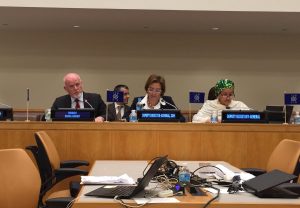As delivered
Closing Remarks by H.E. Mr. Peter Thomson, President of the 71st Session of the General Assembly, at International Dialogue on Migration 2017
19 April, 2017
Distinguished Delegates
Ladies and Gentlemen,
I would like to thank the International Organization for Migration for inviting me to address the closing session of the 2017 International Dialogue on Migration.
I would have been here yesterday to speak at the opening session, but as I am sure you know I was convening an all-day High-level SDG Action Event on sustainable finance.
At this SDG Action Event, Member States, the World Bank, business leaders and civil society came together to discuss how we can mobilize the trillions of dollars needed to implement the 2030 Agenda for Sustainable Development.
In many ways, it was a discussion of particular relevance to you, as we look to build a sustainable future for all – including the more than 1 billion migrants across our world.
It is a harsh – and in my view unnecessary – reality of our world that migrants are often amongst the most vulnerable people in our societies.
With racism, xenophobia and related intolerance running rampant in many communities, migrants often suffer social and cultural isolation, restricted from pursuing educational and economic opportunities, and subjected to discrimination, exploitation and abuse.
Despite these immense challenges, the story of global migration has been a largely positive one, with migrants bringing new skills, energy, perspectives and experiences to their new homes, helping to drive economic growth, and enriching the cultural tapestry of their communities.
In this global environment, and with rates of migration consistently on the rise across our world, the time has come for an international agreement to establish a comprehensive approach to human mobility and migration cooperation.
The convening last September of the first High-level General Assembly plenary meeting to Address Large Movements of Refugees and Migrants, the inclusion of the International Organization for Migration as a member of the United Nations family, and the adoption of the New York Declaration for Refugees and Migrants, were all important first steps.
Building on this momentum, the next critical step is, of course, the agreement on a global compact for safe, orderly and regular migration.
Driving the process to develop this global compact is one of the key priorities for this General Assembly Session, and I am pleased to advise that this process is well underway.
Following in-depth consultations among Member States, two weeks ago the modalities resolution for the intergovernmental negotiations leading to a global compact on migration was adopted.
Since then, I have appointed Ambassador Juan Jose Gómez Camacho of Mexico, and Ambassador Jürg Lauber of Switzerland, as co-facilitators to lead the preparatory process, including consultations on the global compact, and the intergovernmental conference in 2018 at which the global compact is expected to be adopted.
Ambassadors Gómez Camacho and Lauber have already shared with Member States a concept note for the first phase of the preparatory process, as well as a work plan of informal thematic sessions, meetings with UN Regional Commissions, and informal interactive multi-stakeholder hearings, to be held around the world.
All of these events will be fundamental to their efforts to capture the experience and expertise of all relevant stakeholders in this process, including Governments, civil society, the private sector, diaspora communities, and migrant organizations.
The timeline for concluding consultations and reaching agreement to the global compact is tight, with the next two years being critical to our efforts.
We must therefore commit to working closely and collaboratively together to enable a comprehensive outcome to be reached. This outcome must address all dimensions of international migration including migration governance, the rights of migrants, and ensuring the vital contributions of migrants to creating a sustainable world can be realised.
To this end, I have been deeply encouraged by the close collaboration that is already underway between IOM and the UN both on the global compact and in preparation for the 2018 intergovernmental conference. This includes between IOM, my office, and the office of the Special Representative of the Secretary-General on International Migration, Louise Arbour.
IOM’s support to the intergovernmental process will continue to be vital as the process evolves, particularly in extending to Member States the required technical and policy expertise.
Excellencies, Ladies and Gentlemen,
International migration is a global challenge that we must all work together to address.
We must implement our commitments under the New York Declaration, and we must put our shoulders to the wheel for an ambitious and comprehensive global compact on migration in 2018. I wish you well in the work ahead.
I thank you.


